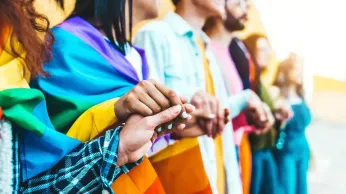
2 hours ago
Senators Baldwin and Murkowski Move to Reinstate LGBTQ+ Youth Crisis Lifeline with Bipartisan Bill
READ TIME: 3 MIN.
In a significant bipartisan move, U.S. Senators Tammy Baldwin (Democrat - Wisconsin) and Lisa Murkowski (Republican - Alaska) have jointly introduced the 988 LGBTQ+ Youth Access Act, legislation intended to reinstate and codify into federal law the specialized LGBTQ+ youth crisis services previously provided through the 988 Suicide & Crisis Lifeline. The service, which was abruptly discontinued by the Trump administration in July 2025, had provided a life-saving resource for LGBTQ+ youth navigating mental health challenges and suicide risk .
The 988 Suicide & Crisis Lifeline, launched nationally in July 2022, included a specialized “Option 3” feature that connected callers directly to counselors trained to support LGBTQ+ youth. This extension was designed to address disproportionately high rates of suicide and mental health distress among LGBTQ+ young people, who are uniquely vulnerable due to factors such as discrimination, stigma, and family rejection . The dedicated line received nearly 1.6 million calls and messages before its funding was terminated, a decision widely condemned by mental health professionals and LGBTQ+ advocacy organizations .
The Trump administration’s justification for the cut centered on concerns related to “radical gender ideology” and parental consent. However, mental health experts, advocates, and a coalition of over 100 Congressional Democrats warned that eliminating the service would have “potentially lethal consequences” for vulnerable youth .
The 988 LGBTQ+ Youth Access Act aims to:
- Restore the “Option 3” feature within the 988 crisis line, which directly links LGBTQ+ youth in crisis to specialized, affirming counselors .
- Make this service a permanent fixture in federal law, protecting it from future administrative changes and ensuring that LGBTQ+ youth have consistent access to appropriate mental health support regardless of the presidential administration .
- Address the ongoing mental health crisis among LGBTQ+ youth, who experience higher rates of suicide, depression, and anxiety than their non-LGBTQ+ peers .
Senator Baldwin, the first openly gay member of the U.S. Senate and an original architect of the 988 Lifeline’s LGBTQ+ pilot program, stated, “We are in the middle of a mental health crisis, and the 988 lifeline saves lives, plain and simple. There is absolutely no good reason that Donald Trump took away this specialized help for our LGBTQ youth. Mental health does not see partisan lines or geography, and I’m proud to be working with Democrats and Republicans to do what’s right and ensure that all kids have access to the help they need—regardless of who is president” .
Senator Murkowski echoed the bipartisan nature of the bill, emphasizing the importance of supporting youth mental health without regard to political divisions .
Mental health advocacy groups, LGBTQ+ organizations, and suicide prevention experts have welcomed the bill as urgently needed. The Trevor Project, a leading suicide prevention organization for LGBTQ+ youth, and other advocacy groups have consistently pointed to research indicating that LGBTQ+ youth are at greater risk for self-harm and suicide, in large part due to societal stigma and lack of supportive resources .
During its operation, the specialized 988 service received over 17.7 million total contacts—including calls, texts, and chats—with the answer rate reaching its highest point of 92 percent in 2025, just before the service was cut . The loss of the “Option 3” feature left many LGBTQ+ youth without access to affirming crisis support, exacerbating the mental health crisis in the community .
The debate over the 988 LGBTQ+ Youth Access Act occurs amid intensifying national discussions about LGBTQ+ rights, particularly in relation to youth and mental health. While some conservative lawmakers and groups have raised concerns about parental consent and the nature of gender-affirming care, the majority of mental health experts argue that specialized, identity-affirming crisis services are essential to saving lives .
A letter signed by 100 Congressional Democrats called on the Department of Health and Human Services to restore the service, warning that “the consequences of inaction are measured in lives lost” .
The 988 LGBTQ+ Youth Access Act now heads to committee, where it will be subject to hearings and potential amendments before advancing to the Senate floor. Advocates are urging swift passage, citing the urgent need for immediate intervention as suicide rates among LGBTQ+ youth remain disproportionately high .
Senator Baldwin is optimistic about the bill’s prospects, noting broad bipartisan support and the momentum created by mental health advocates nationwide. If passed, the legislation would set a precedent for federally protected, specialized mental health resources for LGBTQ+ Americans .
For many LGBTQ+ youth and their families, the restoration of the 988 specialized service represents not just a lifeline, but also a powerful affirmation of their dignity and right to support. As the bill moves forward, its progress will be closely watched by mental health professionals, advocacy groups, and communities across the country who continue to fight for affirming, accessible care .






